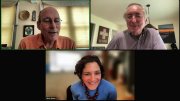What will it take to eliminate homelessness? On July 12, the Harvard Club of Boston, in collaboration with the Harvard Club of Ireland and Harvard Medical School, hosted a conversation between Pulitzer Prize and National Book Award-winning author Tracy Kidder ’67, and Jim O’Connell, M.D. ’82, a physician who has provided care to the unhoused population in Boston for four decades (previously profiled here). Moderated by Northwestern ophthalmology and neurology professor Shira Simon ’04, M.D. ’12, M.B.A. ’12, and attended by more than 200 Harvard affiliates, the discussion centered around Kidder’s latest book, Rough Sleepers: Dr. Jim O’Connell’s Urgent Mission to Bring Healing to Homeless People. He chronicles O’Connell’s founding of the Boston Health Care for the Homeless Program (BHCHP) and its outreach to those who avoid shelters and spend their lives on the streets—individuals known as “rough sleepers.”
Simon introduced O’Connell as “calm, unassuming, and down-to-earth,” sharing a story about a talk he’d given to Harvard Medical School faculty members, during which someone began choking. “Dr. O’Connell paused, he said, ‘Just a moment,’ came off the podium, successfully performed the Heimlich maneuver, and continued speaking,” Simon recalled. “In my mind, this absolutely encapsulates Dr. O’Connell’s essence and elegance. He instinctively and successfully helps anyone in need.”
Kidder described his first ride on the “Outreach Van,” the vehicle that O’Connell and his team at BHCHP (which assists more than 11,000 unhoused persons annually) use to take nightly rides into Boston looking for people sleeping outside. Kidder joined them for five years as he wrote the book. “What I was really moved most by,” Kidder said, “was the warmth of the relationships between this Harvard-educated doctor and his homeless patients. It was a world hidden in plain sight and one that I had ignored.”
Initially, O’Connell had reservations about Kidder shadowing the van rides, wondering “How do you have somebody come into what is otherwise a relatively intimate dance that happens between the clinicians and the people in the street?” However, after consulting many of the homeless people BCHP serves and given Kidder’s past experience writing about physician Paul Farmer’s life fighting tuberculosis in Mountains Beyond Mountains, they took him in. “It took about a week” O’Connell recalled, “before we forgot he was even there.”
O’Connell was surprised by homeless people’s openness to interacting with Kidder and developing relationships with him. The team had been worried about how to “protect the confidentiality and the anonymity that you would think homeless people would cherish,” but O’Connell found that “people really wanted to talk to Tracy, they wanted to tell their stories.” When Rough Sleepers was published, Kidder provided a copy to all the people he had interviewed, according to O’Connell. “The only disgruntlement came from the people who were not in the book.”
Kidder said the experience helped him realize the complexity of homelessness “and the fact that it’s not a single problem” but rather “the symptom of many, many problems we haven’t fully faced up to,” including child abuse, mental illness, and more. O’Connell echoed that thought, adding that “The further I’ve gotten into this, which is now a long time, I know less and less about how to solve it and more and more how to take care of people while they’re stuck in that situation, which is a terrible dilemma to be in.”
Providing care to homeless people on the streets is an existential struggle involving “trying to take care of the person in front of you as best you can,” O’Connell said, but knowing that things won’t improve without structural changes to systems that are really the determinants of health. These include gaps in education, foster care, the welfare system, and correctional programs. “All of those systems are what contribute to homelessness down the line,” O’Connell said. “And unless we fix those, we’re not going to prevent homelessness."
Still, programs like O’Connell’s “can really alleviate enormous amounts of suffering” said Kidder, and their smaller size may translate into higher quality. According to Kidder, patients of BHCHP receive better medical care than most Bostonians. “If you’re out there in the general public, and you’re not homeless, you have a good chance of never seeing the same doctor twice,” Kidder said. “That will not happen in the Boston Healthcare for the Homeless program, and I think that’s something worth looking at.”
At the end of the conversation, former Harvard Club of Ireland president and Harvard Alumni Association regional director for Europe Robert Manson, M.P.A. ’04 fielded questions from the audience and praised the pair for capturing “the humanity of these rough sleepers—people who any of us in Boston encounter every day.” Manson admitted that Rough Sleepers has changed his perception of the unhoused, stating, “I’ll never look upon them the way I have in the past.”
O’Connell acknowledged that delivering medical care, the aspect that first drew him to this work, has proven to be exceptionally challenging on the streets. Whether it involves managing someone’s diabetes or treating a cancer patient without the resources of a hospital setting, the absence of a controlled environment presents difficulties. This ongoing challenge is part of what motivates him and his team, said O’Connell. “You’re never quite where you want to be, so there’s always more to do.”








